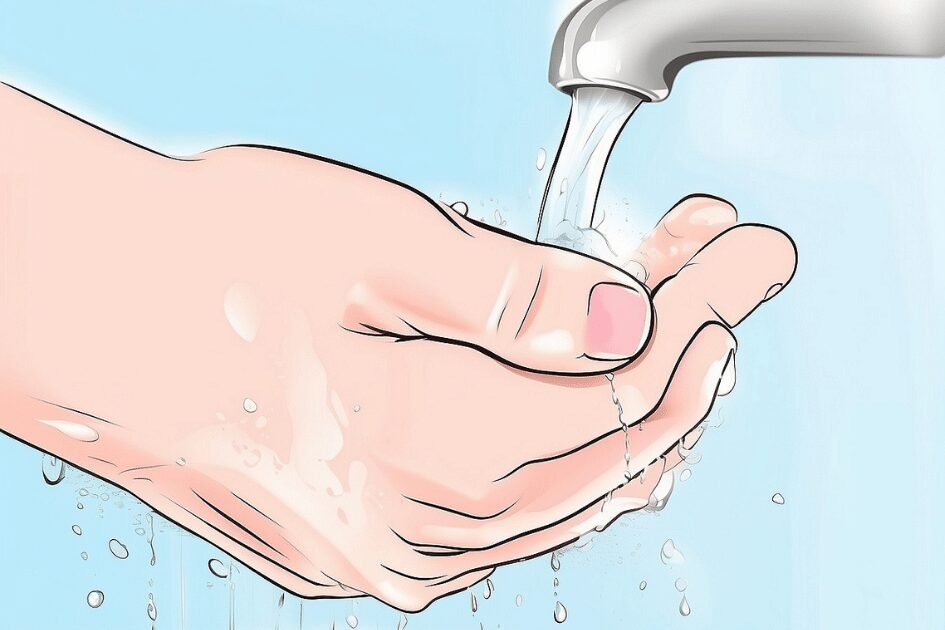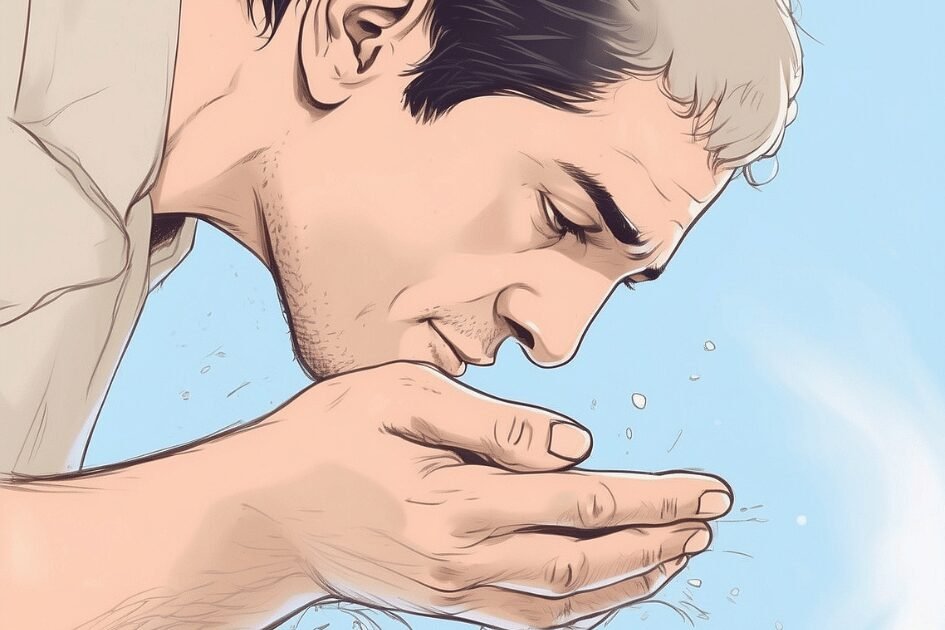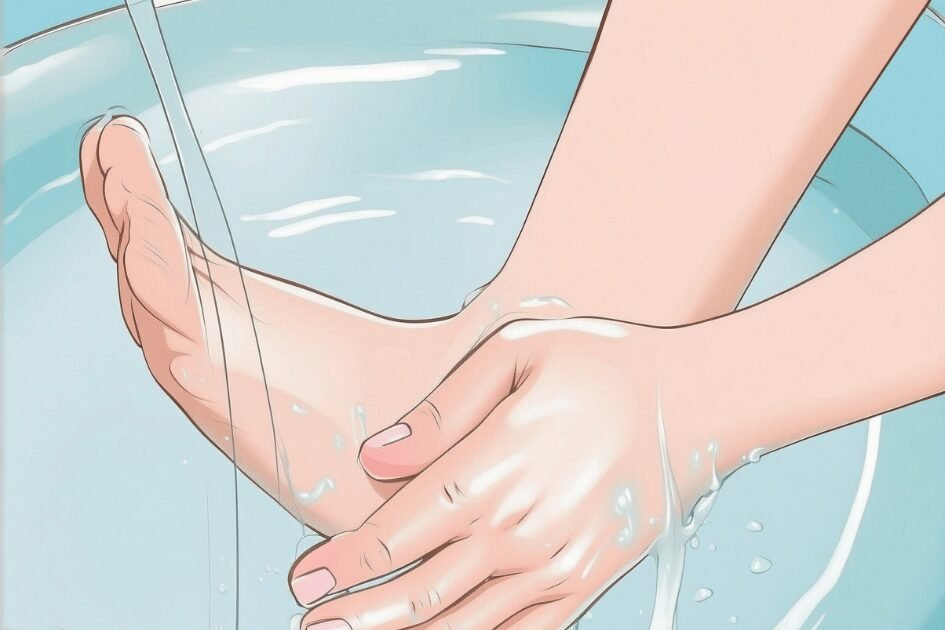Still trying to figure out how to properly perform wudu, the Islamic purification ritual? You’re not alone. Wudu is a beautiful practice essential for Muslims before approaching prayer and speaking with Allah (swt).
This article breaks down how to make wudu in an easy-to-follow guide, ensuring you’ll approach your prayers with confidence and spiritual readiness. Dive in for a fresh start!
Key Takeaways
- Before starting wudu, set your intention (niyyah) for why you’re doing it and say “Bismillah.”
- Follow the steps in order: wash hands, rinse mouth and nose, wash face, wash arms, wipe head and ears, and then the feet.
- Make sure each part of the body is washed well. Arms, mouth, nose, face to earlobes must be cleaned three times; only once when wiping over the head.
- Avoid mistakes like skipping parts or washing out of order to make sure your wudu is correct.
- Wudu cleans both body and spirit. It can take away minor sins and help prevent sickness by keeping clean.
Table of Contents
Understanding the Significance of Wudu

Wudu is not just about getting clean. It’s a special way for Muslims to get ready for prayer and to show respect to Allah (swt). Think of it as getting your body and soul ready to talk with God.
When you do wudu, you follow steps that have been done for thousands of years. You are washing up in the same way the Prophet did, and it links you to a big family of Muslims all over the world.
Each step of wudu cleans parts of your body and helps make your heart pure. Doing wudu means you’re trying to be as clean on the inside as you are on the outside. This act is important before standing in front of Allah (swt) because it shows you’re serious about being good and doing what Islam teaches. Once you complete your wudu, you are ready to pray.
Now, let’s set up everything so we can start learning how to do wudu together!
Intention to Perform Wudu

Knowing why wudu is meaningful helps you get ready to do it right. Before beginning wudu, decide in your heart that you’re washing up for Allah (swt). This step is called making your niyyah, or making your intention to perform wudu.
It’s like a quiet promise to yourself and God that you’re cleaning up for prayer or other worship.
Find a private place where no one will bother you. You want a spot where you can focus and be calm while doing your ablution. Make sure everything you need is close by – clean water, maybe some tissues for nose blowing, and peace away from noise and people.
Saying “Bismillah” as soon as you start makes sure your wudu has Allah’s name all over it! Now, with your heart set on pleasing God and free from distractions, you’re all set to begin the steps of wudu properly.
Step-by-Step Guide to Performing Wudu
Dive into the sacred ritual of Wudu with precision as you follow this detailed step-by-step guide that illuminates every action from intention to the final wash, ensuring your readiness for prayer and spiritual connection—continue reading to master this cleansing cornerstone of Islamic practice.
Step 1: Washing the Hands

Start your wudu by washing your left hand and right hand. Use clean water to wash both hands up to the wrists three times. Rub between each finger and make sure all parts of the hands are wet. This is not just about getting clean; it’s a way to prepare yourself for talking to Allah (swt) in prayer.
Keep your focus as you pour water over your right hand, then over your left hand. Say “Bismillah” (In the name of Allah) before you begin. Doing this shows respect and reminds you why you’re performing wudu – to stand pure before God when it’s time for daily prayer or as-salah[1].
Step 2: Rinsing the Mouth

After you wash your hands, it’s time to rinse your mouth. This step is about cleaning the inside so you’re pure all over. Take some water in your hand, swish it around in your mouth, then spit it out. Repeat this three times.
Step 3: Rinsing the Nose

Next, sniff a little water into your nose and blow it out gently. You should also do this three times. This gets rid of dirt and helps you stay healthy, too.
Rinsing your nose may seem small, but don’t skip it! It is a key part of wudu that help clear away what’s not wanted in our bodies before we pray or read the Quran. It shows respect for Allah (swt) by making sure even the hidden parts of us are clean for worship.
Step 4: Washing the Face

Moving on from cleaning your mouth and nose, it’s time to wash your face. Use your wet hands to gently scrub every part of your face. Make sure the water covers your whole face – from the top of your forehead to below the chin and from ear to ear.
It is important that you do this once, but doing it three times is even better for ensuring ritual purity before you pray or perform other acts of worship.
While washing, remember that this step is not just about hygiene; it’s a moment to purify yourself spiritually. Each splash of water can be a way to wash away distractions and prepare with respect for meeting Allah (swt).
Think about the clear intention (niyyah) you made earlier as you clean each feature: your eyes, nose, cheeks, and lips should all feel refreshed and ready for worship after this cleansing act.
Step 5: Washing the Arms

Wash your left arm and right arm to get ready for prayer. Start with your right arm. Lift it up and pour water over the entire length from the wrist to the elbow three times. Make sure you wet every part, including between your fingers.
Now, do the same with your left arm. Use your hands to rub and clean both arms. This is a key step in becoming clean for speaking with Allah (swt). Washing arms like this helps you follow what has been taught about wudu and prepares you to talk to God through prayer.
Step 6: Wiping the Head

After your arms are clean, it’s time to wipe your entire head and ears. This step is simple but important for being fully ready to pray. With wet hands, lightly brush the palms of your hands over the top of your head from the front hairline to the back. You only need to do this once. The same step applies to a woman’s hair.
Step 7: Wiping the Ears

Next, use your index fingers to clean the ears inside and thumbs for the behind. This act is like respecting every part of you before standing in prayer.
Be gentle as you cover all parts with moisture; there’s no need for pouring water or rubbing hard. Each move should be filled with purpose and care – it shows that you’re taking the process seriously and prepares you mentally, too.
Step 8: Washing the Feet

To wash your feet in wudu, first, make sure you’ve cleaned your hands. Pour water over your right foot up to the ankle and use your left hand to rub and wash between the toes. Do this three times, making sure every part is wet.
Next, take care of the left foot in the same way with fresh water. Getting this step right is important because clean feet are part of being fully pure for prayer.
Check each foot after washing to see if you missed any spots. It’s easy to forget the bottom of your feet or between your toes, but these areas must be clean, too. Washing your feet might seem simple, but it shows obedience to Allah (swt) and prepares you to pray before Him.
Common Mistakes to Avoid During Wudu

Making wudu is important in Islam. It’s a way to clean yourself before praying to Allah (swt). Here are some mistakes you should not make:
- Skipping the niyyah, or intention. You must decide in your heart that you are washing up for Allah.
- Forgetting to say “Bismillah” before starting. This helps you remember why you’re doing wudu.
- Missing parts when you wash hands, face, arms, or feet. Make sure water covers every spot.
- Not washing in the right order; follow the steps just like the messenger of Allah did.
- Washing too much or too little three times is good for each part except when wiping your head and ears.
- Talking too much during wudu can distract you. Try to stay focused on cleaning yourself for prayer.
- Using too much water can be wasteful; use what you need but not more.
- Rushing through wudu might mean missing a step. Take your time and do it well.
The Spiritual and Physical Benefits of Wudu

Wudu cleans your body and spirit. As you wash different parts of your body, it’s not just about getting rid of dirt. This ritual makes you pure for prayer, helping you feel closer to Allah (swt).
Muslims believe that doing wudu wipes away small sins. Each drop of water can take away wrong actions, like gentle rain washing the dust from leaves.
This practice also has health perks because you often clean your hands, mouth, nose, face, arms, and feet. Keeping these parts clean can stop germs from spreading. Medical experts say regular handwashing is one of the best ways to avoid getting sick.
Wiping your head and ears helps you stay alert and focused on dua and dhikr – positive thoughts and prayers reminding us there is no god but Allah. So every time you perform wudu with niyyah (intention), think of it as a chance to refresh inside and out.
Conclusion
Now you know the steps to make wudu, a clean way to prepare for prayer. Remember every step as they help you become pure in body and spirit. Remember to wash each part well and follow the right order.
Doing wudu shows respect for your prayers and love for your faith. Make it a habit, and feel the peace of being ready to stand before Allah (SWT).
FAQ
What is wudu, and why do we need to do it?
Wudu is the act of washing parts of the body to be clean for prayer. Muslims do it to be ritually pure before they perform their five daily prayers.
Can you explain how to make wudu?
First, rinse your mouth three times and wash your face once. Next, wash each arm up to the elbows and wipe over your head just one time. Then, clean both ears with wet fingers and finish by washing your feet up to the ankles.
Did any important people teach us how to make wudu?
Yes, companions of Prophet Muhammad like Abu Hurayrah and Umm Salamah showed us ways to perform wudu according to what they learned from him.
Are there different ways to make wudu in Islam?
There are differences in how people perform wudu because various schools of jurisprudence in Islam interpret teachings slightly differently.
Why must I say “shahada” after making wudu?
Saying the shahada, which means declaring faith in Allah (SWT) and His Prophet after completing wudu, is a way for Muslims to renew their belief every time they prepare for prayer.







